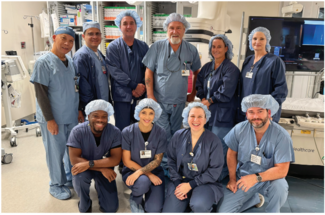Nationwide Study Finds Ambulatory Surgery Centers Treat 15% More Patients in Socially Vulnerable Areas for Cardiac Interventions
Coronary Data From More Than 400,000 Patients Demonstrates Low Adverse Event Rates at 30 Days for PCI in ASCs and Hospital Outpatient Departments
Coronary Data From More Than 400,000 Patients Demonstrates Low Adverse Event Rates at 30 Days for PCI in ASCs and Hospital Outpatient Departments
Society for Cardiovascular Angiography & Interventions (SCAI) News
WASHINGTON, D.C. — The first study evaluating Medicare patients undergoing percutaneous coronary intervention (PCI) in ambulatory surgery centers (ASCs) demonstrated good safety outcomes, such as mortality and adverse event rates at 30 days, compared to outpatient hospital departments, but were less likely to use certain technologies. The late-breaking data were presented May 1 at the Society for Cardiovascular Angiography & Interventions (SCAI) 2025 Scientific Sessions.
Ambulatory surgery centers (ASCs) are non-hospital facilities that provide same-day surgical or procedural care to often low-risk patients. Since Medicare began providing coverage for certain PCI procedures in ASCs in 2020, more of these procedures are being done outside the traditional hospital setting. The shift to ASCs can primarily be attributed to the potential for cost savings, innovation in clinical diagnostics, and the growing aging population in need of care. Between 2024 and 2034, ASC volume is anticipated to increase by 21%. However, little is known about the patient and procedural characteristics and outcomes of PCI in ASCs.
This is the first study to investigate procedural volume trends, patient and procedural characteristics, and outcomes of outpatient PCI performed in ASCs within the Medicare population, benchmarked against hospital outpatient departments. Clinical settings (hospital inpatient, hospital outpatient [OP], and ASC) were determined by the Claim Place of Service codes; and the Social Vulnerability Index, a validated measure of socioeconomic status and community-level stressors developed by the CDC, was used.
Among 408,060 patients who underwent outpatient PCI from 2020 to 2022, 7,494 (1.8%) were in ASCs, and 400,566 (98.2%) were in hospital outpatient departments. The rate of PCIs in ASC increased from 0.01 per 10,000 person-years in 2018 to 0.87 in 2022. Patients treated in ASCs were more often in the Southern region of the U.S. and in socially vulnerable areas (36.6% vs. 21.9%), and fewer patients underwent multivessel PCI (3.0% vs. 5.9%). At 30 days, adverse events such as mortality, stroke, pericardial effusion and tamponade, and access-site bleeding were comparable between groups. Patients treated in the outpatient hospital setting had higher rates of all-cause hospitalization and acute myocardial infarction, while ASC patients had a higher rate of repeat PCI (OR 2.14).
“Patients are drawn to care at ASCs due to the lower costs and greater convenience, which correlates to the shift we’re seeing in PCIs being done at ASCs. We’re also seeing a trend of physicians thoughtfully selecting patients to undergo PCIs in this setting – something we anticipate will increase in the future,” said Katerina Dangas, BMBCh, Research Fellow at the Smith Center for Outcomes Research, Beth Israel Deaconess Medical Center in Boston, and lead author of the study. “Looking forward, participation in national registries, such as the American College of Cardiology’s Cardiovascular ASC Registry suite, will be an important step toward establishing national quality benchmarks tailored to the risk profile of patients treated in the ASC setting.”
As the number of ASC PCI cases increases, continued investigation is warranted.
Session Details:
- “Percutaneous Coronary Intervention in Ambulatory Surgery Centers: Procedural Volume Trends and Outcomes in the Medicare Population”
- Thursday, May 1, 2025; 11:47 - 11:55 AM ET
- Walter E. Washington Convention Center, SCAI Central, Hall D
About SCAI Scientific Sessions 2025
The SCAI Scientific Sessions annual meeting convenes 2,000 of the world’s premier clinicians, scientists, researchers, and innovators in the field of interventional cardiology and endovascular medicine. With 500+ faculty and hundreds of abstracts, experts in the field work together to share the latest clinical data, procedural guidance, and advanced expertise. Highlights will include live cases, featured clinical research, new SCAI clinical documents, case-based learning, and keynote speakers. For more information, visit SCAI 2025 Scientific Sessions | SCAI.
About Society for Cardiovascular Angiography & Interventions (SCAI)
The Society for Cardiovascular Angiography & Interventions, established in 1978, stands as the primary nonprofit medical society dedicated to representing invasive and interventional cardiology. SCAI's mission is to guide the global interventional cardiovascular community by fostering education, advocacy, research, and upholding standards for quality patient care. For more than 40 years, SCAI has exemplified professional excellence and innovation worldwide, cultivating a reputable community of over 5,000 members committed to advancing medical science and providing life-saving care for individuals, both adults and children, affected by cardiovascular disease. For more information, visit SCAI.ORG.
Read more about rual CV care:
Breaking Barriers: Bringing Advanced Cardiac Care to Rural Communities
Find More:
Cardiovascular Ambulatory Surgery Centers (ASCs) Topic Center
The Latest Clinical & Industry News
Grand Rounds With Morton Kern, MD
Peripheral Artery Disease Topic Center
Podcasts: Cath Lab Conversations












